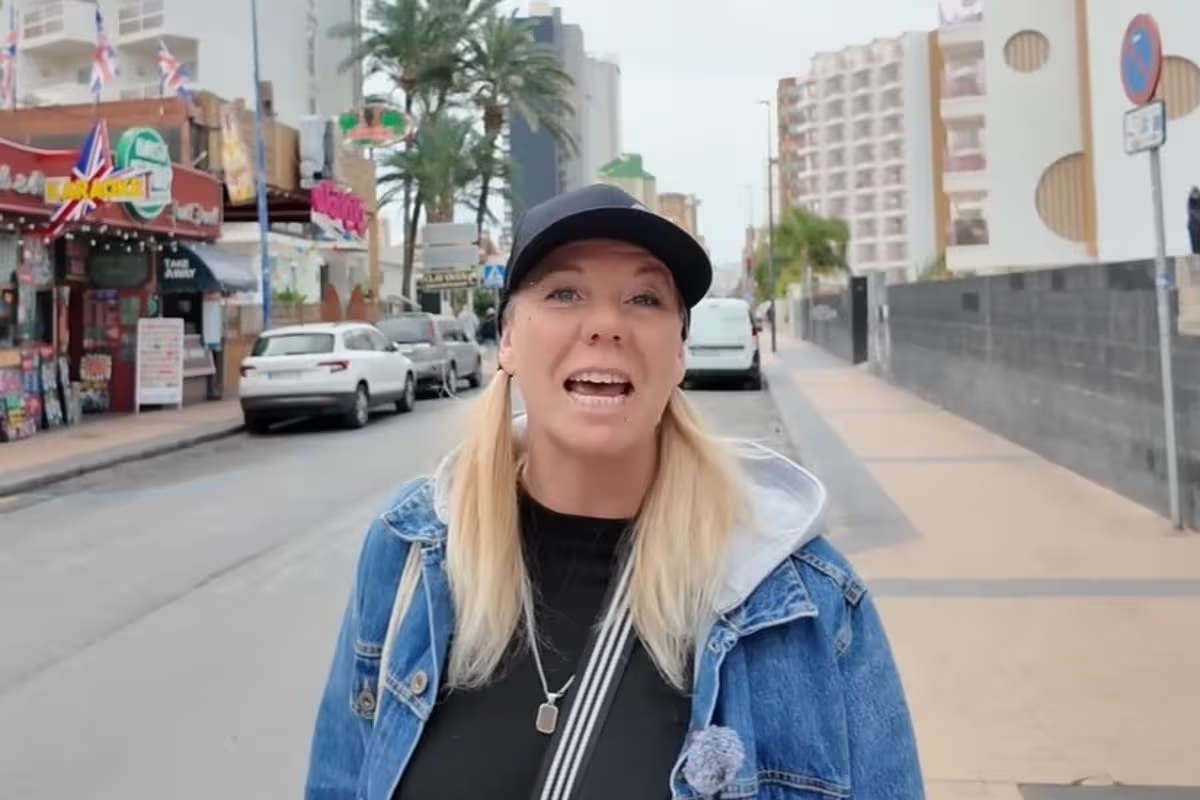Benidorm Enthusiast Lucy Young took a stroll along the famous strip in the popular Spanish resort to investigate prices of pints in February before finding the cheapest and dearest
A British expat who has called Benidorm home for over 20 years took a stroll along the strip to investigate the average cost of a pint of beer – with one particular beverage’s price stunning her
Lucy Young, also known as the Benidorm Enthusiast, went on the boozy adventure after earlier this year revealing the one area that sees “violence beyond comprehension”.
But on the lighter topic of beverages, specifically pints on draft, she said: “Hi guys, the Benidorm enthusiast here, and today we are on the strip, the centre for all the bars and for all the British tourism and partying and we’re going to be finding out what is the price of a print.
“Prices are always something which people like to know about before they come on holiday. So let’s have a walk. We are going to go to every single bar that we find open at the moment, beginning of February, so not everything is open, and we’re going to find out what the prices of the pints are on the Benidorm strip 2026.”
During her adventure, she visited 10 bars — The Last Stop, The Wild Duck, the Western Saloon, Hotel California, The Crown Pub, Brit Station, Funky Flamingo, Million Dollar, Jumping Jacks and Rockstar.
Cheapest
In most bars she went to, the cheapest pint was usually the Spanish lager options, like San Miguel and Estrella, which could usually be snapped up for between €2 (£1.74) and €3 (£2.61).
However, after visiting Hotel California, she said: “They’ve got the local larger which is Cruzcampo on at €1.90 (£1.65) a pint — the cheapest we’ve found yet.”
The most expensive draft beer at Hotel California was a Guinness, and even that was just €3.70 (£3.22).
Busiest bar
Lucy said Brit Station, a fairly new bar in the strip, had the biggest selection of pints of beer available, with an Amstel being the cheapest at €2 to the most expensive being Guinness at €4.90 (£4.26).
And standing by the packed boozer, she commented: “Absolutely spoiled for choice for daytime offers here as well at Brit Station. Bucket deals, two for ones, happy hours, it’s all going on here.
“And it really shows because there’s a lot of people inside here today. And we’re filming this at a quiet time of year. It’s probably the busiest bar we’ve come across. They’re also obviously enjoying these daytime offers.”
Most expensive pint
At Rock Star, Lucy noted that Heineken was the cheapest pint option at just €2.
She continued: “Then you’ve got Carlsberg and Moretti — €5 a pint, quite pricey, but they do have an offer on the two for one.”
But as for the pint that really stunned her, it was a UK favourite. With a shocked expression, she explained: “We’ve got Guinness at €6.50 (£5.66) a pint! Again, quite pricey…”
As for other bars on the strip, she said Jumping Jacks was particularly popular in the daytime, especially because they don’t raise their pint prices at night.
She also visited Funky Flamingo where a Guinness is €4.60 (£4) and she said it was her favourite bar on the strip, but stressed that it was not just because she loves doing karaoke there.
Lucy also singled out the Western Saloon for always having a “great atmosphere” and a pint of Estrella was set at €2.70 (£2.35) while Guinness was priced at €3.80 (£3.31).
Concluding
Finishing her investigation on the video, which you can watch in full here, she said: “So there you have it guys, a good look around the Benidorm strip at daytime pint prices for 2026. I think on average, if you stick to the local lager, you are going to be looking to pay between €2 and €2.50. Very very cheap I think, still, even though a lot of prices for other things have gone up in Benidorm in recent years.
“But do bear in mind these are the daytime prices and a lot of the bars, not all of them, but a lot of the pieces will go up when the nightlife starts and the entertainment starts in the evening.”
One person replied: “Looks very reasonable I’m coming over with a few mates in June.”
Another said: “I tend to stick to bottles to be honest Lucy, on average though loads cheaper than here in the UK for sure.”
A third said: “No wonder Rockstar is empty at those prices, never been in plenty of other bars to try.”
One commenter advised: “Stick to bottles, had so many bad pints in Benidorm i wouldn’t touch it now no matter how much it was. No weights and measures there so no guarantee what’s coming through them taps.”











